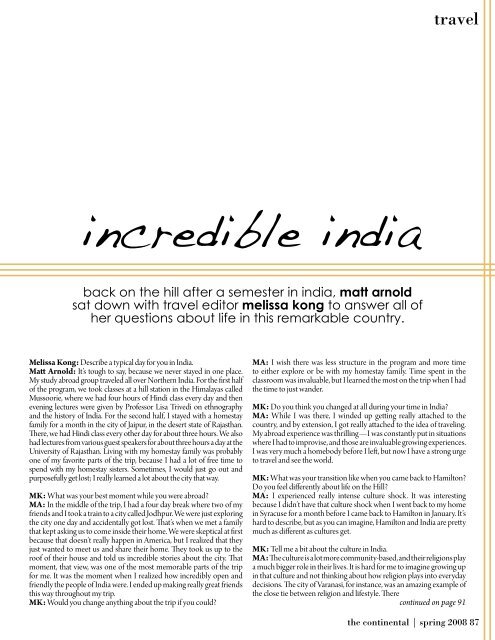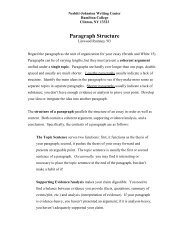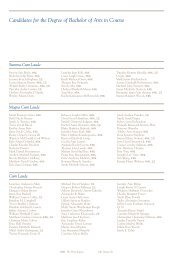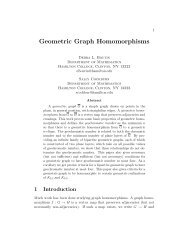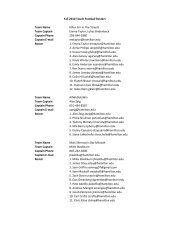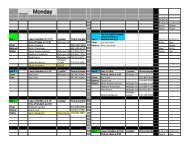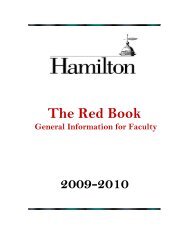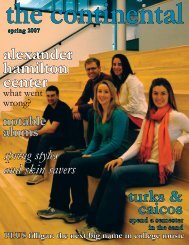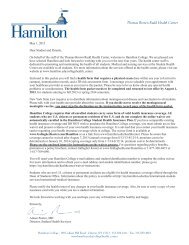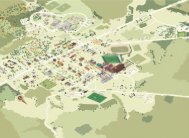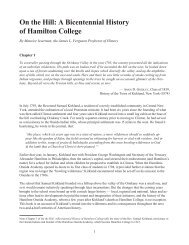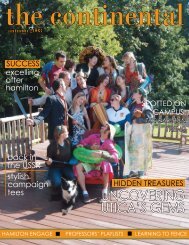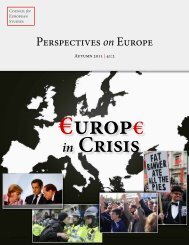The Continental - Hamilton College
The Continental - Hamilton College
The Continental - Hamilton College
Create successful ePaper yourself
Turn your PDF publications into a flip-book with our unique Google optimized e-Paper software.
travelincredible indiaback on the hill after a semester in india, matt arnoldsat down with travel editor melissa kong to answer all ofher questions about life in this remarkable country.Melissa Kong: Describe a typical day for you in India.Matt Arnold: It’s tough to say, because we never stayed in one place.My study abroad group traveled all over Northern India. For the first halfof the program, we took classes at a hill station in the Himalayas calledMussoorie, where we had four hours of Hindi class every day and thenevening lectures were given by Professor Lisa Trivedi on ethnographyand the history of India. For the second half, I stayed with a homestayfamily for a month in the city of Jaipur, in the desert state of Rajasthan.<strong>The</strong>re, we had Hindi class every other day for about three hours. We alsohad lectures from various guest speakers for about three hours a day at theUniversity of Rajasthan. Living with my homestay family was probablyone of my favorite parts of the trip, because I had a lot of free time tospend with my homestay sisters. Sometimes, I would just go out andpurposefully get lost; I really learned a lot about the city that way.MK: What was your best moment while you were abroad?MA: In the middle of the trip, I had a four day break where two of myfriends and I took a train to a city called Jodhpur. We were just exploringthe city one day and accidentally got lost. That’s when we met a familythat kept asking us to come inside their home. We were skeptical at firstbecause that doesn’t really happen in America, but I realized that theyjust wanted to meet us and share their home. <strong>The</strong>y took us up to theroof of their house and told us incredible stories about the city. Thatmoment, that view, was one of the most memorable parts of the tripfor me. It was the moment when I realized how incredibly open andfriendly the people of India were. I ended up making really great friendsthis way throughout my trip.MK: Would you change anything about the trip if you could?MA: I wish there was less structure in the program and more timeto either explore or be with my homestay family. Time spent in theclassroom was invaluable, but I learned the most on the trip when I hadthe time to just wander.MK: Do you think you changed at all during your time in India?MA: While I was there, I winded up getting really attached to thecountry, and by extension, I got really attached to the idea of traveling.My abroad experience was thrilling—I was constantly put in situationswhere I had to improvise, and those are invaluable growing experiences.I was very much a homebody before I left, but now I have a strong urgeto travel and see the world.MK: What was your transition like when you came back to <strong>Hamilton</strong>?Do you feel differently about life on the Hill?MA: I experienced really intense culture shock. It was interestingbecause I didn’t have that culture shock when I went back to my homein Syracuse for a month before I came back to <strong>Hamilton</strong> in January. It’shard to describe, but as you can imagine, <strong>Hamilton</strong> and India are prettymuch as different as cultures get.MK: Tell me a bit about the culture in India.MA: <strong>The</strong> culture is a lot more community-based, and their religions playa much bigger role in their lives. It is hard for me to imagine growing upin that culture and not thinking about how religion plays into everydaydecisions. <strong>The</strong> city of Varanasi, for instance, was an amazing example ofthe close tie between religion and lifestyle. <strong>The</strong>recontinued on page 91the continental | spring 2008 87


